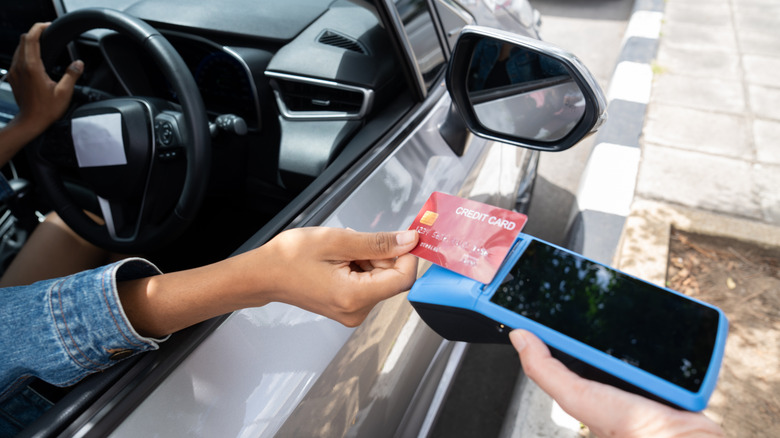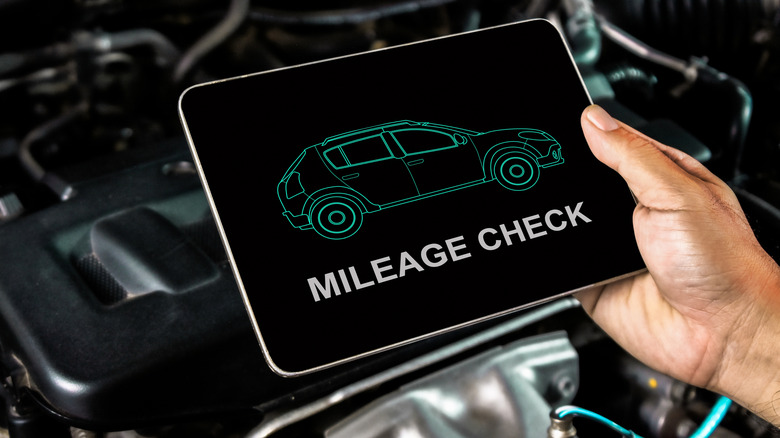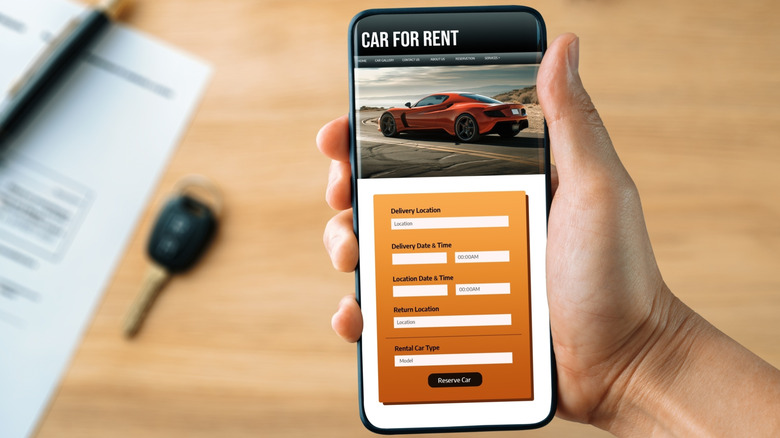11 Worst Rental Car Mistakes To Avoid
Whether traveling for work or as part of a much-needed vacation with friends or family, a rental car is often a critical element in the planning phase. Making a reservation with a car rental company often involves utilizing the airport's additional infrastructure. In many cases, you'll pick your car up from the vendor desk at the airport and bring it back ahead of your return flight. Similar patterns take shape for people renting cars for a weekend road trip in lieu of their own on extended holidays that see a departure from home instead of an airport. You may want to see road trip hacks to make your adventure easier.
Regardless of the conditions that have brought you into contact with a rental agency, a lot often flies under the radar during these interactions. From the upselling opportunities that sales staff never fail to take advantage of to the simple mistakes regarding the return phase that can cost you extra, a number of problems can inflate the price considerably. Avoiding these easy-to-make rental car mistakes is something that everyone can do. But they're equally easy to fall victim to if you aren't staying on top of the interaction. Keeping your eyes on these potential mistakes as you reserve, pick up, and drop off your rental car can help you save money and avoid unnecessary hassle in the process.
1. Paying for extra insurance with the rental company
One of the first mistakes you can make when showing up to collect your rental car involves an upsell that the agency will almost certainly pitch to you. Even if you've already rejected the offer to add insurance products to your rental when booking it online, you'll be enticed to pay extra for this coverage when you collect your car. Often, insurance products are packaged as an upfront charge that will lower the deductible in the event of a collision or something else that requires the car to be fixed. The salespeople in a rental car agency can be quite pushy with this pitch. Unfortunately, more than a few renters have walked away from the sales desk with additional insurance policies they didn't want and often did not use.
In reality, this is a redundancy for almost all car renters. Modern credit cards feature integrated perks that run the gamut in terms of coverage areas. One perk that many cards feature is additional insurance coverage for car rentals. This means you already have built-in insurance if you pay the rental charges with a credit card that includes this valuable addition. It's a good idea to look through your cardholder agreement and explore the perks your credit card offers through its online portal to see if yours covers this valuable addition. Even if it doesn't, your personal car insurance may include secondary coverage for rental cars.
2. Not taking notice of potential mileage caps
Many rentals today offer unlimited mileage on the car you drive away. But this isn't a standard policy that every rental agreement will include. It's critically important to thoroughly read through the rental car's documentation fine print to flag any potential hang-ups lurking in the background. This is one of those issues that can be extremely costly if you aren't aware of its presence tucked away in the contract. Mileage caps are often written in miles per day, resulting in a hard stop upon which every additional mile you drive gets charged, sometimes at an exorbitant rate. The inclusion of a mileage cap isn't a typical find these days.
However, the fact that it can still factor into your rental should give you pause when signing the rental agreement, no matter where you pick up the car or what company you select for your driving needs. Getting stung with charges for a mileage cap overage can be extremely painful, so make sure you are on the lookout for this inclusion and steer clear of any rental company that tries to charge you for mileage rather than providing an unlimited range.
3. Paying for extras you don't need (or could get for free)
Many people who have rented cars before will be familiar with all the added extras that can be tacked on to a rental agreement. If you're traveling with a group, you might want to share the driving responsibilities. This means you'll want to add an extra driver. Those traveling with small children might want to add a car seat to the reservation rather than bringing one themselves. There's toll payment technology, GPS devices, and more; the list goes on and on.
With many standard reservations, lots of these optional extras will cost you more. But the reality is that they don't have to. Some rental companies don't charge additional fees for things like car seats or secondary drivers. Booking with one of these companies can keep your costs lower, even if the base fare to take the car away starts at a higher price. If you plan on adding services to your reservation, it's important to look at the full picture rather than just the basic cost structure. After adding these additional elements, a cheaper car frequently winds up more expensive than an inclusive rental selection.
There's also the reality that some of these inclusions aren't necessary for any driver. A GPS device has become almost entirely obsolete, so tacking one onto your reservation is wasteful no matter where you're traveling to. It's also worth exploring memberships that you may enjoy. Your AAA membership, for instance, can give you access to free additions like a car seat, even if the rental company would have otherwise charged you.
4. Skipping the damage check sheet
The agents working at rental car desks are in the business of upselling and adding to the profits raked in by the company. This means they'll be overly aggressive at times when trying to sell you on optional extras that cost more. But this posture can also translate into a lackadaisical checkout process. Frequent travelers often find rental car agents who skim over the damage checklist during the initial check-in process. Whether you've added to your reservation or not, agents frequently seek to position themselves as a friendly face and a laid-back assistant to your adventures.
Unfortunately, this demeanor can change substantially when it comes time to bring the car back and close the book on your trip. That same rental car agent who didn't want to look too closely at the vehicle's damage may pull out the magnifying glass to scour the car for scratches. To add insult to injury, if you are charged for damage to the car, you can be sure that the money won't be going toward making repairs but rather into the company's profits.
Not all agents are vultures in this regard. However, it's impossible to know for sure if you're working with someone who might be trying to set you up for failure later on. It might seem a little confrontational, but the alternative is far worse. When collecting the keys for your rental car, it's critically important to walk around the vehicle and note any damage you find. It can also be a good idea to take pictures to solidify proof that a dent or scratch was indeed there before you drove off the lot.
5. Keeping the car past the 24-hour mark on drop-off day
In most cases, the time you collect your car can have an important knock-on effect on your plans to return it. Most rental car companies operate on a 24-hour cost basis timeline. This means that if you pick up a car at 10 a.m., you'll need to return it by 10 a.m. on the day you plan to bring it back to avoid being charged for an additional, full day of use.
Sometimes, keeping a vehicle beyond this mark is unavoidable. However, if it's at all possible within your travel plans, make sure you return the car within this window. Avoiding additional charges just because you opted to keep the card for an extra few hours when it wasn't necessary is often something that can be worked around in your itinerary. Heading back to the airport four hours early instead of three, for instance, can be a small price to pay to reduce the cost of your rental car reservation, sometimes significantly.
It's worth noting, though, that most of the major rental companies offer a grace period and won't charge you the full rate for a new day just because you arrived at the drop-off point a few minutes late. Some offer a 30-minute window, while others may provide up to an hour or two. Understanding the return window and how you'll be charged is an important part of the reservation process that can't be overlooked.
6. Paying nothing upfront when making a reservation
It may not be a common occurrence, but more than a few travelers have experienced a nightmare scenario in which they arrive at the reservation desk only to find that there is no car waiting for them. This is rare, but rental agencies have been known to occasionally cancel bookings when they can get away with it. If you booked your rental car weeks or months in advance but didn't pay a deposit for the service, some unscrupulous rental agencies might cancel your reservation at the last minute to rebook the vehicle at a much higher price. Again, this isn't a common issue, but it happens occasionally.
A simple way to avoid this potentially catastrophic change to your travel plans is to pay for the booking upfront or give a down payment when making the reservation. You have much greater built-in protection against your rental company pulling the rug out from under you if you have already parted with some of your money. Without handing over even a small down payment, some rental companies may feel entitled to do what they want with the car, treating you as more of a penciled-in reservation than a concrete booking.
7. Failing to explore your rewards options
Many car rental companies offer crossover deals with airlines, credit card companies, and hotel chains. You may have a loyalty account with a car rental agency that might provide upgrades or even free rental days if you use the service often enough. However, your loyalty account with the company isn't the only program you should explore when booking a car. Partnerships across the travel industry can give you access to all kinds of perks, even if you aren't a frequent renter. Your airline or hotel points may be transferable, allowing you to book a rental car with rewards points rather than your bank account.
Similarly, just as an AAA membership can help deliver free add-ons, your branded credit cards and loyalty accounts with other affiliated companies might give you access to free upgrades. You might also have additional inclusions that wouldn't otherwise come with the car thrown into the mix. These kinds of perks can amplify the value your rental car provides.
8. Assuming you can drive anywhere you want without restriction
In addition to mileage caps, renters may discover that their rental agreement doesn't cover travel to certain areas. If you're reserving a car in Europe, for instance, you may find that you're restricted from leaving the country without paying an additional fee or even as a concrete rule that can't be avoided. Even though transiting between countries in much of Europe can feel akin to driving across state lines in the U.S., some rental agreements prohibit a more expansive form of wandering like this.
Personally, when moving from England to Ireland with the help of a rented van a few years ago, my reservation included an unavoidable £100 "international insurance certificate." No one checked this document through any of the four (plus two more through Wales) border crossings the vehicle performed, but the additional cost was part of the rental company's policies.
You might also run into a scenario where rough terrain or precarious driving routes are included on a prohibited list. For instance, some of the most dangerous roads in Europe transit through mountain passes, across portions of gravel pathways, and along cliffs with unprotected, sheer drops. Your rental car agency may limit your ability to explore these kinds of roadways in Europe or elsewhere.
9. Picking up and dropping off at different locations
Another mistake that can sometimes be unavoidable is picking up a rental in one location and returning it in another. Sometimes, your itinerary will require a change of scenery like this. You might use your rental car as a mobility tool for the local area you're exploring and then as a secondary mode of transportation to take you from one place to the other. In some cases, this can be a cost-effective way to bridge the gap between the two distant waypoints along your travel route. However, you should be prepared for a potentially painful cost addition to the rental if you don't return the car to the same location you took it from.
Sometimes, these costs can be a simple add-on. However, if you're covering a large distance between the two points on the map, secondary location fees can run up into the thousands. Bringing a car back to a different location can be a tremendous hassle for the rental company, and they're more than happy to charge you out the nose for this inconvenience. As with some other problem areas you may encounter with a rental car, these charges can be significantly worse when exploring foreign countries. In Europe, for instance, it might be functionally simple to rent a car in Germany and drop it off in France, but you can expect the complicated international reality of this decision to cost you substantially.
10. Opting not to fill up the car before returning it
No matter where you rent a car for your adventures, one rule is universal. You'll need to bring the vehicle back with the same amount of gas in the tank as when you drove away to avoid substantial additional charges. Sometimes, rental car companies will intentionally hand you the keys with the gas tank sitting at half or three-quarters full. This can be a problem because hitting that figure right on the nose when you bring it to a station to fill up is more of a guessing game than it needs to be. Either way, filling the car to return it at the same fuel level is an absolute must. Regardless of whether you've driven 100 or 1,000 miles in the vehicle, you will be overcharged for the cost of gas if you leave refueling to the rental car agency.
In most cases, your rental agreement or a printed policy inside the office will give you information on the cost they will pass on to you. These charges are often marked up by a significant rate. Travelers shouldn't be surprised to see markups running $50 or more beyond what it would have cost to simply fill the car up themselves. These policies can vary greatly depending on the location and the company. You might be charged a flat rate to refuel the car on top of whatever the pump price might be in the area, or you might see a premium added to the cost per gallon. Avoiding this problem is easy; just head to a gas station with the car yourself.
11. Assuming a rental car is the only way to go when traveling
Finally, one mistake some travelers fall into the habit of making is assuming that the only option for getting around town is to rent a car. No matter where your travels take you, plenty of public transportation options are often available to help you move around the city or explore areas beyond it. This isn't to say that rental cars are always or even often a bad idea, but the reality is that every trip will be unique.
Sometimes, a rental car is a worthwhile investment to help you maintain mobility while visiting friends or family members or heading to a new city on a business trip or weekend getaway. At other times, renting a car is a redundancy you don't need to spend your time and money on. A day trip to London (check out the best things to do), for instance, will see you fly into an airport (regardless of which one it is) directly connected to the city's tube or rail infrastructure. Therefore, heading into the city and moseying about town only requires walking to the metro connection once you've made it through passport control. Every trip is different, so each adventure you engage in might demand renting a car to elevate your experience or act as an additional expense that only invites complications to your travel.











